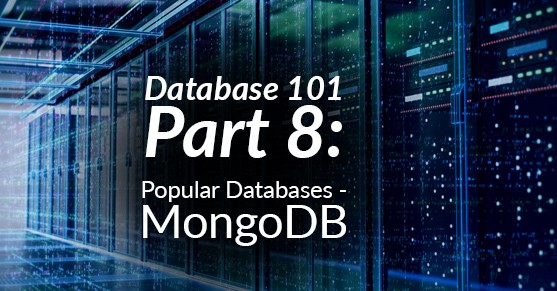MongoDB is a document-oriented NoSQL database that uses the Binary Serialization Object Notation (BSON) file format — similar to JavaScript Object Notation (JSON) — for versatile structuring and easy database storage. MongoDB has been popularly used by companies needing highly scalable storage for large sets of distributed data, and its efficient language has also made it an attractive option.
Released under the Affero General Public License (APGL) MongoDb is free to use and, as of 2018, is the fifth most popular database choice for businesses around the world. As opposed to the traditional relational database format, NoSQL databases are used for companies with big data. Additionally, typical SQL-based RDBMS have rigid predefined schema, vertical scalability, and are table based whereas NoSQL document-oriented databases like MongoDB have dynamic schematics for unstructured data, horizontal scalability, and a variety of options for storing data (e.g., column-/document-oriented, graph-based, etc.).
Accompany flexible data storage, MongoDB offers a number of database functions for big data/big business; ad hoc queries and indexing, practical aggregation, and the MongoDB Management Service (MMS). Using ad hoc queries to request specified fields and JavaScript functions, MongoDB returns information efficiently. Additionally, the primary and secondary indexing tools allows efficient query resolution.
When it comes to aggregation, MongoDB uses their MapReduce programming model for filtering, sorting, and summarizing operations. In short, MapReduce gives users a way to process massive amounts of data across numerous servers/machines.
Another key feature is the MongoDB Management Service, which was introduced to the database in 2011. Since then, it’s become a popular cloud-based service suite for tracking and managing the various deployments and machines. Users can also employ MMS to monitor hardware metrics, database performance, and create alerts to warn about issues.
For databases with slow performance brought on by big data, MongoDB is a common choice to solve that problem. Whatever your reason is for using this highly powerful and effective database, the database team at XTIVIA can help you license, deploy, and manage MongoDB for any of the following versions.
Editions (presented alphabetically, list subject to change at MongoDB’s whim):
- MongoDB Community Server Edition
- MongoDB Enterprise Server Edition
- Other products:
- MongDB Atlas (DBaaS)
- MongoDB Stitch (serverless platform: “QueryAnywhere,” “Functions,” “Triggers,” and “Mobile Sync”)
- Ops Manager (on-prem manager)
- Cloud Manager
- MongoDB Compass (GUI)
- MongoDB Connector (BI)
- Other products:
High Availability/Replication:
- Replica Sets
- Sharded Cluster
Operating System:
- Microsoft Windows (Vista and later), Linux, Solaris, FreeBSD, and MacOS X (10.7 and later)
- Recommended Operating System is Ubuntu
Cloud:
- MongoDB Atlas
- MongoDB Stitch
- Microsoft Azure
- Amazon RDS/Aurora
- Google Cloud Platform (GCP)
History:
Development on MongoDB began in 2007 by the software company, 10gen, for use as a part of a platform as a service (PaaS) product. Hoping to offer commercial support and specific services, 10gen opted for an open source development model, and in 2013 the company name was changed to MongoDB Inc. and the database software was offered as an open source, cross-platform document-oriented NoSQL database program. Popular and multifunctional usage of MongoDB allowed for significant growth and profits for MongoDB Inc., and they became a publicly traded company in 2017 (“MDB” on NASDAQ). The company releases new updates and products each year (including their most recent serverless platform product, MongoDB Stitch), and as of 2018, MongoDB has been downloaded more than 40 million times.

